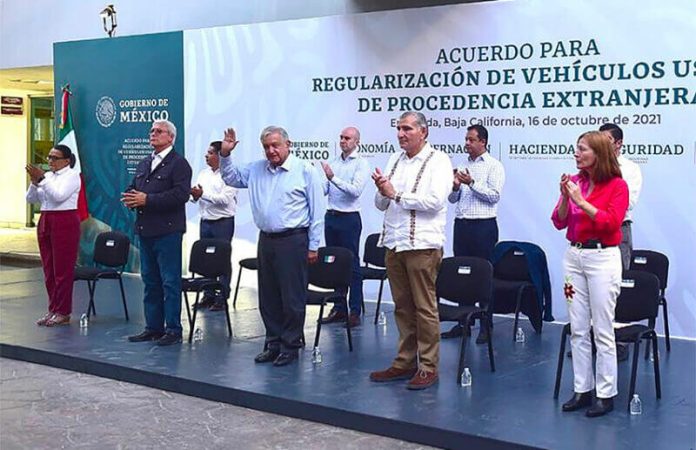President López Obrador signed a decree on Saturday to regularize used cars that were imported into Mexico illegally.
Announced by the president last week, the regularization program will initially be limited to the six northern border states and Baja California Sur but is slated to extend to all 32 states.
Registering an auto chocolate (chocolate car), as an illegally imported vehicle is colloquially known, will cost approximately 2,500 pesos (about US $120), López Obrador said after signing the amnesty agreement in Ensenada, Baja California.
There are an estimated 500,000 autos chocolate in Baja California alone, and millions across the country. The vast majority come into Mexico from the United States.
“We took the decision to regularize cars that don’t have papers, now they will be registered,” López Obrador said.
“Those who have these cars are going to make a contribution of about 2,500 pesos. … This money will stay in Baja California and will be used to fill potholes and improve the roads. If the 500,000 vehicles are regularized, there will be about 1.3 billion pesos [US $63.7 million] for the six municipalities,” he said.
Similarly, income derived from the regularization of autos chocolate in Sonora, Chihuahua, Coahuila, Nuevo León, Tamaulipas and Baja California Sur will be used to repair and upgrade roads in those states. Federal lawmakers are set to vote Monday on an initiative that seeks to ensure that money collected via the regularization program in the northern border region stays there.
Speaking alongside López Obrador in Ensenada, Security Minister Rosa Icela said the decision to allow the regularization of autos chocolate was taken because such vehicles are frequently used by criminal groups.
She said 370 vehicles used in homicides were seized by Baja California authorities between November 1, 2019 and August 30, 2020, and 78% of them had been illegally imported into Mexico.
“Hence the importance of advancing with regularization so that these vehicles are no longer anonymous and investigations can be carried out to find those responsible for violence,” Rodríguez said.
“That’s why the president … took the decision to regularize these vehicles that move about the whole border area and until today are irregular,” she said.
The security minister said that regularization will only be available to the owners of cars that are already in Mexico, although it was unclear how that rule would be enforced.
The Mexican Association of Automotive Distributors (AMDA) said last week that allowing the regularization of autos chocolate will only exacerbate the illegal importation problem.
Legalization “will represent a prize for the mafias that get rich with the smuggling of these kinds of vehicles,” AMDA said in a statement, adding that regularization will hurt sales in the formal automotive sector.
With reports from El Universal and Milenio
